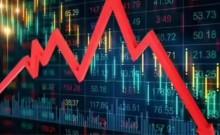Indian stock markets plunged yet again with the benchmark BSE Sensex falling nearly 600 points on Tuesday, amid concerns over China's slowing growth and weak domestic cues.
Sensex fell 586 points or 2.24% to close at 25,696, reverting to levels seen on 24 August, when it posted its biggest intra-day fall in seven years amid a massive sell-off in global markets.
Among the sectoral indices, bankex, realty and metal were the biggest losers, falling by over 3% each. Stock prices of real estate developer DLF fell over 4% to close at Rs 106.25 , while Punjab National Bank (PNB) shares dropped 7.25% to end at Rs 134.35.
Meanwhile, the Shanghai composite index also tumbled over 3% in the morning trade, as data showed that manufacturing activity in the country fell to three-year low in August. However, the index pared some losses to close at 3,166 points, down 1.23%.
On the domestic front, the gross domestic product (GDP) growth of 7% in the first quarter was well below market expectations. The weaker-than-expected growth figure weighed on the investors sentiment, dragging the Indian stock markets down.
"When you analyse the GDP data, we see that things could have been better, but unfortunately things are going relatively slow. The only silver lining out of all this particularly gloomy numbers is that we are seeing the spending from the government side, which is on the rise," says Deven Choksey, MD, KR Choksey Securities, in an interview to ET Now.
The sell-off was also triggered by renewed expectations of an interest rate hike by the US central bank in September. The US stock markets ended lower on Monday after comments from a senior official of the US Federal Reserve signaled at a possible rate hike this month.
Besides, rising global crude oil prices led to a heavy sell-off. Brent crude oil prices rose for the third consecutive session on Monday, posting biggest three-day gains since August 1990.
"Brent has achieved a price gain of a good 25%, while WTI is up by more than 27%. In both cases, these are their most pronounced three-day increases since August 1990, when Iraqi dictator Saddam Hussein invaded the neighbouring country of Kuwait, causing oil prices to soar," said Commerzbank Corporates & Markets in a note.
However, a rise in crude oil prices is not good for the domestic economy, as it may push inflation rate up undermining the prospects of interest rate cuts by the Reserve Bank of India (RBI).
"Rise in crude oil prices is not going to be good news for markets and it is also probably not going to be good news for the Indian economy," said Atsi Seth of Moody's Investor Services.

















